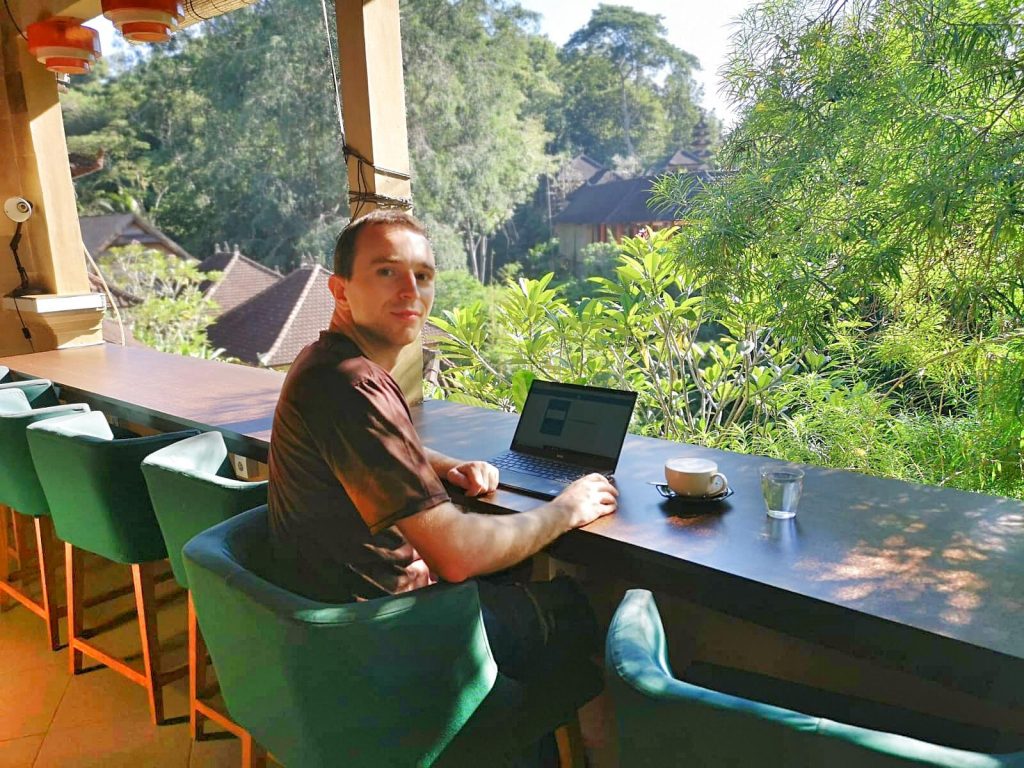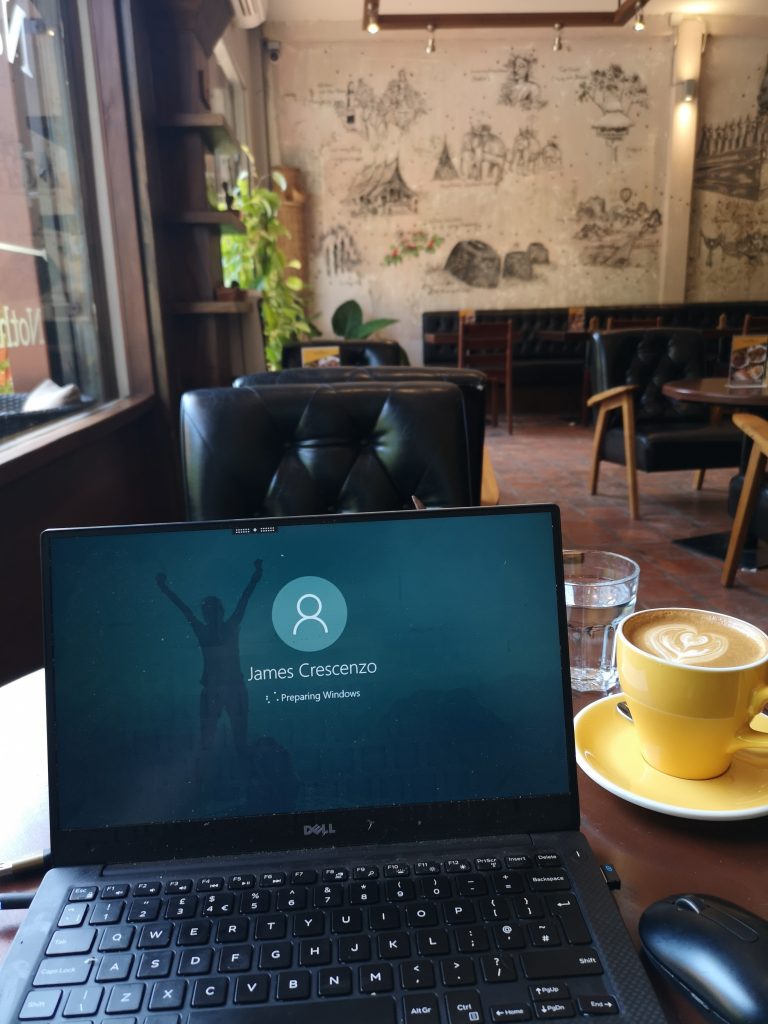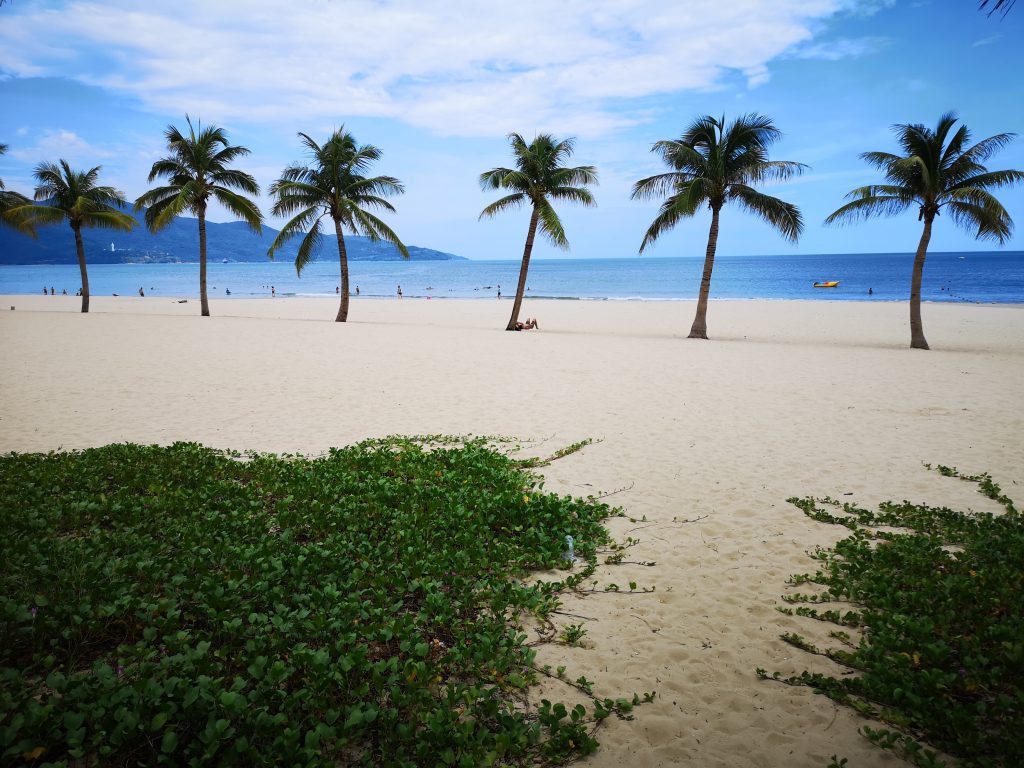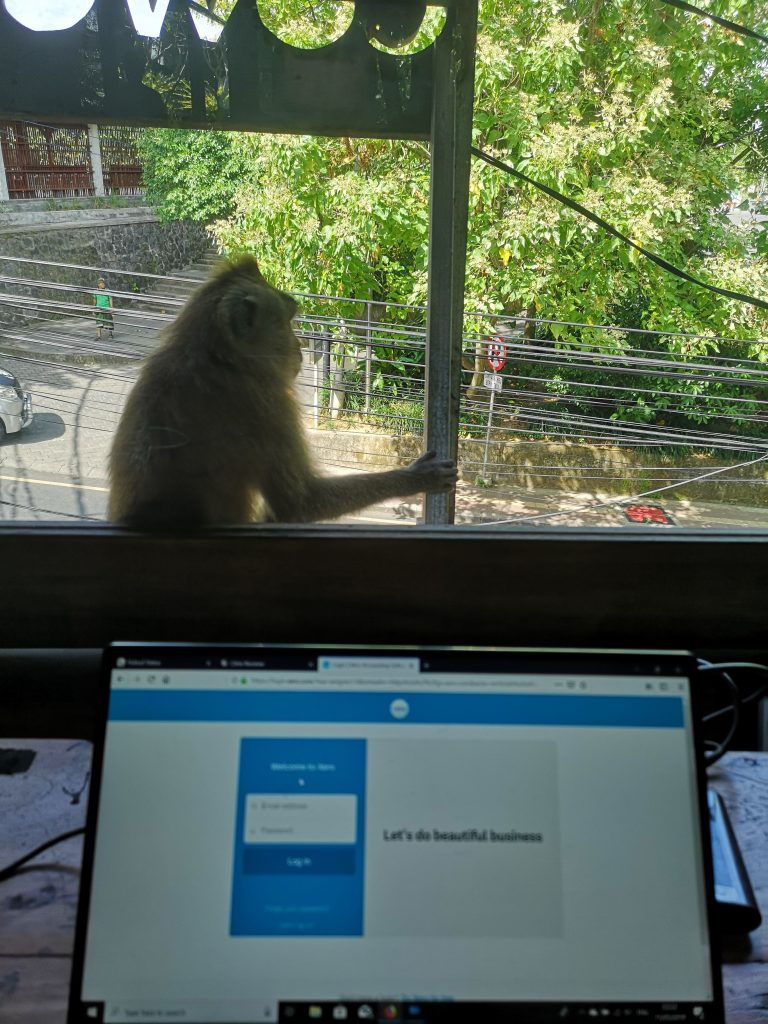Welcome to Backpack and Work
Interested in working remotely and travelling at the same time? I set this blog up to help people understand that it is possible to do this as a lifestyle and give advice on how to achieve this, while also sharing travel tips and stories.
The conventional ‘save up money, quit your job and go travelling’ is no doubt an amazing experience but it ends when your bank balance dries up. I could have done this but I didn’t want a time limit imposed on travelling by my bank account. By working remotely, long-term travel becomes financially sustainable and you can go at a slow pace in each location. Since I started this lifestyle in October 2018, I’ve had countless great experiences, explored much of Asia and, as cliched as it sounds, made lifelong friends. I’ve worked through all of this and continue to do so. It’s because of this, that I can look to the future knowing it isn’t about to come to an end. In fact, my bank balance has increased since I started this adventure.
In this post I will be giving advice on how to get remote work and answering some common questions that people ask me.
Don’t you have to be an IT expert or social media star to work remotely?
Often when I meet people and it comes up in conversation that I work while travelling, people assume I work in IT or social media (as one Japanese girl in a bar exclaimed, “ah, you are YouTuber!?”). This isn’t the case at all, there are lots of normal jobs you can do remotely – you don’t have to work in IT or be an ‘influencer’. When I answer that I’m an accountant, people are usually surprised that I can do it remotely. I don’t feel like it should be a surprise, so much of what everyone does these days is online so you really can do a lot from anywhere.
I see quite a few adverts pop up online offering courses on how to become an ‘influencer’ and generate income through social media. While I do think there are people out there creating valuable content across a variety of platforms, the market isn’t big enough for everyone to succeed and there seems to be an increasing amount of nonsense in this area. Think about it, if someone is selling a course about how to make money through social media, yet most of their income actually comes from selling that course, do they really have a lifestyle you can follow? This blog isn’t about being an ‘influencer’, this is about doing a normal job from anywhere and having a great time travelling.
From other digital nomads I’ve met while travelling and a look around Google, here are some normal jobs that can be done from anywhere, as long as you have a decent Wi-Fi connection:
Accountant
Translator
Transcriptionist
Graphic designer
Video editor
Audio editor
3D artist
VFX artist
Voice actor
Online teacher
Software engineer
Website designer
Programmer
App developer
Systems administrator
Data analyst
Data entry
Social media manager
Digital marketer
Media buyer
SEO specialist
Customer service manager
Project manager
Event planner
Virtual assistant
Virtual coach
Nutritionist
Consultant
Onboarding specialist
Sales expert
Market researcher
Crowdsourcing manager
Copyrighting
Freelance writer
E-Book writer or publisher
Dropshipper
Of course, there are loads of jobs that are dependent on being in a certain physical location. If you’re in one of these and are interested in working online remotely, think about what other careers you could follow. I’m not suggesting that changing career is an easy decision – it will probably mean taking some steps down the career ladder and a pay cut. As difficult as that change may be, remember that the retirement age in most countries is at least 65 and rising. If you’re young(ish), that’s a lot of years to go! I was 30 when I left the UK – I decided that I didn’t want or need to spend all of the next 35+ years of my life in an office from Monday to Friday. I didn’t need to change careers to start this lifestyle, but plenty of people older than me have changed career for one reason or another. If you don’t feel like you have the skills to work remotely at the moment, invest in yourself and develop them!

What’s a digital nomad?
A digital nomad is someone that takes advantage of technology to enable them to work from anywhere in the world, providing they have a laptop and an internet connection. It’s usually linked to travel, since the desire to work from anywhere usually comes from a desire to travel more than normal work holidays allow.
I don’t really like the term, it feels pretentious to say “I’m a digital nomad” but it’s easy to understand and it’s the commonly accepted phrase to describe this lifestyle.

How do you become a digital nomad?
I’m not going to sugar-coat it, this isn’t an easy or fast process. I think the best way to write about it is to break it down into steps.
Step 1: Skills
I’ve touched on it above, the fundamental point for all of this is that you need to have a skill, or skills, that you can use anywhere in the world to generate income. If you don’t currently have suitable skills, this step will probably take a long time but that doesn’t make it impossible. You could achieve this by getting a job that will eventually allow you to work remotely, either in the same company or as a freelancer using the skills you develop while working there. As an alternative, there are numerous websites offering online courses to build skills, such as Skillshare and Udemy. You can also look to join a class or bootcamp in your area to develop the skill(s) you’re interested in.
A mistake some people make is trying to do too much – they want to teach English online while also building up a dropshipping business and running a YouTube channel. It’s too much, focus on one thing that you’re good at and think about other things once you’ve built a digital nomad lifestyle. People and businesses tend to pay for specialists in different areas, not one person that can do multiple things badly. You wouldn’t pay me to advise you on social media marketing, but you might pay me to prepare your accounts.
Ultimately, skills aren’t something you can get overnight and everyone’s circumstances are different. It may be faster in other jobs but, in my profession, I’d say it’s best to spend several years at an accountancy firm, first training and taking professional qualifications, then gaining experience managing a portfolio of clients before you have sufficient expertise to do what I do. A faster alternative in my industry is bookkeeping – it doesn’t take as long to develop this skill, although this is reflected in the pay. For me, I had about a decade of experience when I made the decision that I wanted to pursue this lifestyle so I didn’t need to develop skills. This meant the first stage for me was mental preparation, which leads us to…

Step 2: Prepare yourself mentally
Most people have various barriers to freedom which stop them from travelling long term. You don’t need to remove all of these barriers just yet, but you need to think through them and have solutions in mind. Everyone’s circumstances are different but I’m going to cover the common issues:
1. Relationships
If you’re in a relationship, this is probably the most difficult barrier, the one most likely to cause pain and the one you should talk about first. Ultimately, if you have a partner that doesn’t want to go travelling and you’re set on it, then the relationship might not last. Everyone has different situations and long distance relationships are possible, but you need to accept that you might not be able to travel and stay with your partner. Before travelling, I knew people that seemed to only be with their partner because they had been together a long time and had a settled lifestyle but were they really happy? The honest answer is I don’t know but I think everyone knows couples that seem to be unhappy together. I’ve met various people that broke up with their boyfriend or girlfriend before travelling and they all valued their freedom over being forced to stay in one location and continuing their conventional lifestyle. Sometimes, they sounded very relieved to be free of their ex-partner!
2. Fear
This could be many things – fear of countries that are perceived to be dangerous, anxiety about new social situations, worries about getting lost, fear of giving up a secure income or something else.
The media portrays many countries as being dangerous and, in my experience, it simply hasn’t been true. Of course there are dangers all over the world, but that’s likely to be true for your home country too. I remember being asked by one of my bosses, before a holiday to Colombia a couple of years ago, why I was going there and being told that I would get kidnapped or murdered. The holiday passed without incident and I had a great time. While in Colombia, an attempted terrorist attack took place in London (where I was living), so where is more dangerous? The sad reality is that bad things can happen anywhere, people have died while on backpacking trips, but people also die crossing the road in their hometown or from being the victim of an unprovoked attack while they walk down the street. Tragedies happen, that doesn’t mean you should spend your life hiding.
You might find yourself nervous about new social situations with strangers in hostels, or simply about ordering food in a country where you don’t speak the language. These are normal worries that lots of people have and can overcome. Remember if you’re meeting fellow backpackers you’re guaranteed to all have one interest in common – travel. If you don’t know what to say, ask where they’re from, where they’re going, where they’ve been, if they have any recommendations and see where the conversation goes. This happens all the time in hostels. On the language side, English is pretty much essential if you want to go solo travelling. It is the universal language in hostels and there will always be some English speakers in cities or tourist areas. The standard and number of English speakers varies significantly depending on where you are. If you’re nervous, stick to well-worn tourist trails to begin with before venturing out into less visited places. Smartphones have made things a lot easier too – Google Translate has helped me out various times, mainly in Taiwan, Japan, Korea and China. It’s not comprehensive but you can download many languages on the app so they work offline. Also, if you’re black or white and travelling in Asia, the locals won’t expect you to speak their language so you don’t have to feel uncomfortable about not knowing their language. Sometimes, I’ve found locals react nervously to me since they don’t speak English which I feel bad about – we’re in their country! It may be harder elsewhere, for example if you’re in South America and don’t speak Spanish, but it’s not impossible to get by.
Getting lost is something you really don’t need to worry about and, again, this is something that smartphones have made a lot easier. I imagine it must have been a nightmare in the past relying on physical maps and asking for directions from people that might not speak the same language. These days, you can simply download a map app which can work offline and still give your physical location. I use maps.me – all I need to do is download the maps for the next country while I have Wi-Fi and it gets me everywhere on foot. The app shows your location so, if you take a wrong turn, you’ll easily be able to get back on track.
Giving up a secure income can be a big worry but most people don’t spend their entire career in one job. Even if you can stay with the same business and work remotely as I have, you may have to leave as an employee and begin a freelance arrangement. This means giving up various employment benefits such as job security although, on the plus side, you can justify a higher pay per hour due to your loss of benefits and the employee related costs that the business no longer has to incur. To work remotely, you need employable skills so you should always be able to find another job if you decide to come back home. The best way to mitigate this fear is to build up savings before you leave. That way, if you lose work, you can continue travelling while looking for new work.
3. Financial commitments
Another tricky area and something that might take a while to resolve. The biggest issue here is usually if you have a lease or own a property. I was originally going to sell my flat before travelling but difficult market conditions, created by my Brexit voting countrymen, meant I was going to lose money on the flat so I decided to rent it out in the end. Mortgage interest and letting agent fees take a big chunk of the rental income but the profit generated here gives me a second income stream that has all gone into savings. If you’re renting and can’t get out of the lease, you may have to accept waiting for the lease to run out/reach a break clause before you can leave.
4. Material possessions
If you’re travelling full time, you’re likely to be living out of 1-2 backpacks. Aside from clothes, toiletries and the equipment you need to work, there won’t be many other things in your luggage. There might be some travel accessories, books or gadgets, but nobody is taking large household items with them. I couldn’t believe how much stuff I had to sell, give to charity or throw away when I left but most of us accumulate a lot of unnecessary possessions. The more fortunate among us will be able to store a lot of things in a large family home but, for me, I had to get rid of almost everything. I do have one suitcase of possessions with family, but half of that is just filled with paperwork that I need to keep. You don’t need to get rid of everything now, but be prepared to give up your possessions when the time comes.
5. Be positive
It’s cliched but the key point mentally is to be positive and embrace change. It’s a lot harder to find solutions when you’re being negative or narrow minded about things… not to mention it’s no fun! A positive attitude will also help while travelling though that doesn’t mean you should say yes to everything, as that can lead you to joining a Korean cult…

Step 3: Switching to location independent work
You’ve got the skills, you’re mentally prepared, now you need to make work arrangements that allow you to be location independent. I’m going to break this into two sections, the first covers work you already have and the second is for finding new work.
1. How do I convince my bosses to let me work remotely?
I think the biggest barrier to remote work is often the culture of a company. If it’s a complete departure from the way they’re used to working, it can be difficult to make the change. However, difficult isn’t impossible and I was able to make an agreement with my bosses. Ultimately, if you make yourself a valued employee and want to work remotely, they are going to be more willing to compromise. You need to be willing to compromise as well – there is one thing in my remote working arrangement which I don’t like, but one of my bosses was adamant about this point and it wasn’t a deal breaker for me so I accepted it. Of course, you need to be able to explain why you can work remotely with little to no impact on the business so be prepared with a proposal. Think about what benefits you can offer a business with remote work too – it might give you the chance to network with people that you and your colleagues wouldn’t normally get the opportunity to, or you might be able to take advantage of time zone differences to complete urgent work and have it ready in your bosses inbox before he or she wakes up in the morning. If you’re going down to part time hours, you can also offer greater flexibility. Colleagues may get overloaded at busy times and you can be available to work additional hours and take some of their load. Or maybe you can be available to work weekends so work is complete for your bosses when they arrive on Monday morning (which also means you can visit tourist spots on weekdays when they’re quieter).
2. How do I find new work?
If you want to work as a freelancer, there are a number of online marketplaces out there where you can advertise yourself and also apply to jobs/projects posted by potential clients. Some of the popular sites are:
https://www.peopleperhour.com/
If you want to freelance and don’t have much in the way of savings, don’t just quit your secure job and book that ticket to Thailand or wherever with the intention of finding work online once you’re there. Build up some work and/or savings before you leave or you could wind up cashless and heading home in no time!
If you’re looking to become an employee, your best starting point is to simply Google “remote working jobs in x (your industry)” or “best remote working companies”, start researching and see what your options are. Some useful sites to use are:
https://www.workingnomads.co/jobs
https://weworkremotely.com/top-remote-companies
I wouldn’t expect you to find something immediately – there are far fewer fully remote jobs than conventional office based jobs at the moment but opportunities are out there. Update: now that the coronavirus has forced many businesses to temporarily adapt to remote working, I suspect more companies will be more open to remote workers in the future.

Step 4: Decide where you want to go!
The fun begins here. This is something you can start looking into anytime and, with step 3 completed, you can now start booking trips! This should be the easy part (well, you might be really torn on where to go first!) and it really depends what your dream destinations are. The three key ingredients that make a good digital nomad destination are:
1) Its quality as a travel destination
2) Ease of access to fast Wi-Fi
3) Low cost
I’d focus on number 1 first – decide where you want to go then you can research things like coworking spaces in the area, daily costs etc. There’s a huge amount of resources on the internet that can help you here. Over time, I’m planning to build information on this blog about places I have visited and make this site a top resource for people looking to work remotely and travel.
Other factors to consider in a digital nomad location are the weather, food and the digital nomad community.
To give you some ideas, here are 15 popular digital nomad destinations around the world:
Chiang Mai, Thailand
Bali, Indonesia
Taipei, Taiwan
Penang (George Town), Malaysia
Hoi An, Vietnam
Siem Reap, Cambodia
Playa del Carmen, Mexico
Medellin, Colombia
Buenos Aires, Argentina
Lisbon, Portugal
Las Palmas de Gran Canaria, Spain
Malta
Tallinn, Estonia (Estonia has even launched a digital nomad e-visa)
Krakow, Poland
Prague, Czech Republic
The list above is based on a mixture of my personal experiences and what others have said. From this list, I’ve spent time travelling and working in all of the Asian destinations and can recommend all of them. I’ve been to Medellin and Malta on holidays and the locations are great but I have no experience of working in them. I can’t personally comment on the others yet but they’re all on my list!

The final step: Just go!
You’ve developed the skills, prepared yourself mentally, obtained some remote work and decided where you want to start this journey, the only thing left to do is go! Say your goodbyes to friends, family and colleagues, have those farewell parties and get on that plane!
Now, that’s the biggest part of this post finished. Time to move on to some other common questions that come up about this lifestyle.
But isn’t travelling expensive?
It all depends how you do it and where you are. I’m only working limited hours so I can’t afford to spend all my time in expensive countries such as Japan, but I can save money in cheap places like Vietnam. This offsets the excess spending (compared to my income) in pricy destinations. Being cost conscious is crucial too – you can easily overspend by doing things in style and the easy way but you won’t be able to travel for long like that unless you have a really high level of income or a huge bank balance. I’m hardly on a shoe string budget but staying in hostels most of the time is key to keeping costs down. As a solo traveler, I prefer hostels anyway as they’re great for meeting people. Why stay in an expensive hotel if you’re just going to be alone? In my experience you usually get better Wi-Fi in hostels too, necessary for working online. Avoid taxis where you can and take public transport. For when you do need a taxi, tuk tuk or whatever the local private transport is, learn to haggle! In some countries, I always expect to be quoted a high price (especially at transport hubs/tourist spots) which can normally be at least halved. In fact, I’ve been quoted up to ten times the normal price before so don’t be afraid to haggle or walk away if you feel like they’re trying to take advantage of you. Look online or use apps like Grab and Uber where they’re available to see what the price should be. Developing bargaining skills also comes in handy when shopping at local markets.
Remember that you probably spend a lot of money in your home country just to survive and work. Mortgage payments/rent, bills, transport costs, food, work clothes, it all adds up. Even in Japan, the amount I spent on accommodation per month was significantly less than my monthly mortgage payment, and that’s before taking into account all the other household bills I had on top. Your savings on accommodation are likely to be significantly larger if you’re currently renting too. I don’t have to spend time or money commuting to work anymore, so my transport costs now are all for a good reason – travelling to new places! Food is the one area where it’s easy to spend more while travelling, since you might be eating out most or all of the time. Depending where you are in the world, you can often get hostels with kitchens for guests to use. Hostel kitchens are however, uncommon in Asia, which has contributed to me cooking a total of zero times since I left the UK (admittedly, I’d have probably been lazy and gone out to eat every night regardless).
Once you’re travelling, you’ll also make big savings on a major holiday cost – air fares! When I was working in an office, I’d pay big money for return flights to the other side of the world every time I wanted a two week holiday, not to mention losing some of those holiday days to the long flights and jet lag. Leaving England, my initial one way ticket to Seoul wasn’t cheap but I’ve been able to travel around Asia since then for a relatively low cost. By staying in a region for a prolonged period of time, you can benefit from budget airlines or cheap transport on the ground/water. You can also book flights on the cheapest days rather than more expensive flights that fit in with your time off work. I use Skyscanner and select the whole month to get a quick snapshot of daily prices to my next destination.
Another key consideration on the financial side is who you’re working for or, more precisely, where they are based. If you’re working remotely you can potentially work for businesses anywhere in the world (in practice, local requirements for your profession or your connections can make this tricky). Ideally, you want to work for an organisation that is based in a wealthy country and get paid accordingly. I only work part time but I earn a UK income, which goes a long way in South East Asia.
What about Wi-Fi?
You can find Wi-Fi pretty much everywhere these days. I’ve finished a set of accounts while on an overnight boat journey, sent internal emails at the side of a nightclub dancefloor (by phone, not with my laptop!) and had a meeting via WhatsApp while at the beach. Usually, I work from my accommodation and very rarely have trouble with this. On occasion, I’ve had to find an alternative nearby or grit my teeth and put up with a regularly freezing screen to get something done but no work arrangement is perfect. If I was back working in an office in the south of England, I’d be raging about delayed/cancelled Southern trains far more often than I find myself getting frustrated with a dodgy Wi-Fi connection. If you don’t want to work at your accommodation you can always go to a coffee shop, allowing you to work while enjoying some great coffee and food. Co-working spaces are another option and, while you won’t find them everywhere you go, they are getting increasingly popular and commonplace.
To date, I’ve only really had Wi-Fi problems in Sri Lanka. I was able to get work done in the country, but there were frustrations in finding a good place to work from in nearly every area I stayed in.

Doesn’t work interfere with the fun you’re having?
Sometimes, yes. The simple solution is to keep your plans for each destination flexible. At times, I’ve missed out on visiting attractions because work came up and I was on a fixed schedule so, unless there is a reason to do so, I try not to book anything ahead now. Ultimately, you have to be professional about work and get everything done properly. My bosses were skeptical about this remote working arrangement, so demonstrating that I can still do everything is something I take very seriously.
On the plus side, staying longer in a location for work does give you more time to become immersed in the culture and get some added enjoyment. The extra nights may allow you to try out a bar or restaurant that you wouldn’t otherwise have been able to, or to spend extra time with someone that you’ve met.

Final thoughts
So far, my decision to leave the office and work from anywhere has been one of the best decisions I’ve ever made. I don’t see this as a permanent lifestyle, I think eventually I’ll want to be in a settled location but, for the time being, I’m loving it. If you want to travel for an extended period but can’t afford to or still want to work, I’d highly recommend looking for a remote working solution.
Its so nice. hope i have a fluent english